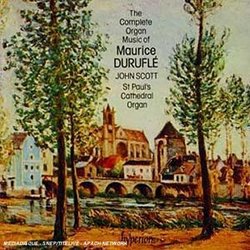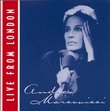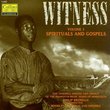| All Artists: Maurice Durufle, John Scott Title: Organ Music by Maurice Duruflé Members Wishing: 0 Total Copies: 0 Label: Hyperion UK Release Date: 11/16/1993 Album Type: Import Genre: Classical Styles: Opera & Classical Vocal, Chamber Music, Forms & Genres, Suites, Historical Periods, Classical (c.1770-1830), Modern, 20th, & 21st Century Number of Discs: 1 SwapaCD Credits: 1 UPC: 034571163680 |
Search - Maurice Durufle, John Scott :: Organ Music by Maurice Duruflé
 | Maurice Durufle, John Scott Organ Music by Maurice Duruflé Genre: Classical
|
Larger Image |
CD DetailsSimilar CDs |
CD ReviewsThe wrong instrument ! Paul Fasang | Düsseldorf , NRW GER | 08/03/2000 (3 out of 5 stars) "This recording of the complete Organ Works of Maurice Duruflé is actually very well performed , exspecially the Veni Creator Spiritus , where he works with the choir , but unfortunatly the organ (a Gigantic British romantic organ ) is not compatible with Duruflés quite romantic organ pieces . Exspacially the Prelude and Fuge does not build up the way it could , and the Toccata from the Suite just does not have the power as for examle Bernard Leonardys recording from St.Eustache or Olivier Latrys recording from St.Ouen , Rouen (this I must say is my favorite recording) has. Too bad he didn't choose a great Cavaillé-Coll Organ for this project ." Durufl? by Latry FJC | 04/23/2006 (5 out of 5 stars) "Attention: the recording of Olivier Latry mentioned below was NOT made in St-Ouen/Rouen, but at Durufl?s organ at St-Etienne-du-Mont/Paris. It could hardly be recommended because the organ was then in a very bad state (out-of-tune!). What a pity, because Latrys playing is brilliant. Moreover, Durufl? didn't consider his own instrument appropriate to his music. He preferred the one in Soisson Cathedral." Absolutely Brilliant! Bass Barreltone | Phoenix, AZ United States | 06/03/2000 (5 out of 5 stars) "Durufle is my favorite composer, and has been ever since I first sang the Requiem. He did not compose many works, but each one is perfect. This is my favorite recording of Durufle's organ works, due to the sheer sense of power. The organ of St. Paul's is, however non-French, magnificent beyond words, and the cathedral's staggering acoustics give an ambience to the works which, of course, cannot be found on any other recording. John Scott's performance is that of a master; he knows the works, the organ, and the cathedral so well that he can judge exactly how fast to play and how long to pause. Scott's registration is creative (yet completely respectful to the composer), and his technical ability seems at times supernatural.The only down side to this recording is this: whatever the acoustics add to the power of the music, they take away from its clarity. Great care was obviously taken to make Durufle's intricate passages as clear as possible, but at times, they still tend to wash together. To appreciate this recording to its fullest, it is often necessary to follow along with the score. It also helps to become familiar with a recording made in a smaller, clearer acoustic. I recommend Thomas Trotter's recording for this process-- but once you know the pieces, return to St. Paul's, and Scott's own genius is made even more obvious.On a side note, I bought my copy while visiting the cathedral in London in 1993. What a building!"
|

 Track Listings (11) - Disc #1
Track Listings (11) - Disc #1

